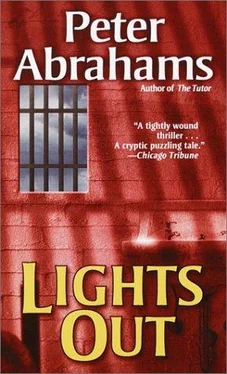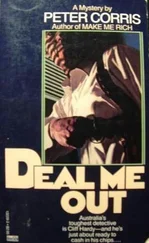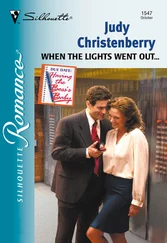Eddie opened the steel door. It led to a short set of cement steps, smelling of stale beer. At the top was a bulkhead door, locked from the inside with a bolt. Eddie slid it back, pushed open the door, and climbed out onto the street.
He’d been wrong about the time. It was day. A cloudy day, dreary and dark, probably, but bright enough to make him blink. Eddie let the bulkhead door fall shut and started to move away. A woman on a mountain bike screamed, “You fucking idiot,” and almost ran him down.
“Bonjour, monsieur,” said the maitre d’ of Au Vieux Marron. “C’ est ferme jusque a cinq et demi.”
“Knock it off,” said Eddie.
“Pardon?”
They stood in the doorway of the restaurant, Eddie outside in the cold rain, the maitre d’ inside, warm and dry. It was about three o’clock and the restaurant was empty. The maitre d’ hadn’t yet put on his jacket and tie. He wore a white shirt, black pants, black vest, and a puzzled smile.
“Is it part of your job, speaking French all the time?”
The maitre d’s smile changed to an expression that reminded Eddie of Charles de Gaulle. “I am in the food business, monsieur. French is the language of food.”
“I’m not hungry.”
“Then may I ask to what we owe this visit?”
“I was here last night,” Eddie said, thinking that the maitre d’ spoke better English than he did.
“Armagnac, avec et sans glacons,” said the maitre d’, recovering his smile; a knowing one.
“That’s me,” said Eddie. “I want my C-note back.”
“Pardon?”
“C-note. It means-”
“I know the meaning of C-note. What was your complaint?”
“No complaints,” said Eddie. “I don’t want the actual money. Just the C-note.” Eddie produced the $350 roll and peeled off two fifties. “Here.”
The maitre d’ eyed the money but made no move to take it. “It’s a rare bill, perhaps?”
“No. Call it a lucky charm.”
The knowing expression grew stronger. The maitre d’ began to resemble Claude Rains. “The tables?” he said. “Or the horses?”
“You’re reading my mind.”
“I am something of a gambler myself,” said the maitre d’. “Have you been to Atlantic City?”
“Not yet.”
The maitre d’ was shocked. “Not yet! And so nearby!” He shook his head. “Atlantic City, quel …” Words failed him in two languages.
The maitre d’ led Eddie past the kitchen, into the office. A framed autographed photo of Julia Child hung on the wall. The maitre d’ removed it, revealing a small safe. He glanced at Eddie, smiled again, then turned to block his view as he spun the dial. On the desk lay a half-eaten hot dog with ketchup and relish.
The maitre d’ took out a cash box, carried it to the desk, opened it. Inside were checks, credit-card slips, money. The maitre d’ fingered through it. He picked out a hundred-dollar bill. Then another. And another. He laid the three of them on the desk, Benjamin Franklin side up, flipped them over, then over again.
“Which is the lucky charm?”
Eddie studied the bills. There had to be a reason why Paz wanted the bill, had to be a reason why El Rojo had tried to smuggle it to him; something that made it different from the other bills. Invisible ink? Should he take all three, examine them under ultraviolet light? Eddie doubted that El Rojo had that kind of writing material in his cell.
One of the bills was crisp and unwrinkled; as though fresh from the mint. Eddie concentrated on the other two, holding each up to the light. He looked for clues in Franklin’s prosperous image, in the leafy scene on the back, in the clock tower of Independence Hall, where the time appeared to be 1:25. He checked the margins and the other open spaces for handwriting, but found none. None, unless you counted the tiny numbers inked here and there on the more wrinkled of the two bills.
Eddie had another look. He located the numbers one through fourteen, all on the Franklin side, inscribed in black ink. Some of them were written under individual digits of the serial number, B41081554G. The one , for example, appeared under the four . Other numbers were elsewhere: ten in the borders of the S in “ONE HUNDRED DOLLARS.”
“This is it,” Eddie said.
“How do you know?” asked the maitre d’, peering over his shoulder.
“By the cigarette smell.”
The maitre d’ sniffed the air. “You have a good nose, monsieur.”
“Armagnac lovers. We’re all like that.” Eddie handed over the two fifties.
The maitre d’ looked at them doubtfully, tried snapping one of them between his fingers.
“That doesn’t prove a thing,” Eddie said. He’d known a few counterfeiters.
Eddie took the bus back to New York. On a pad of paper he realigned the printed letters and numbers on the bill according to the order suggested by the inked-in numbers, one through fourteen. That produced the following sequence: 4650571914THST
Meaningless. Eddie knew nothing about codes. He made the obvious move, assigning a letter value to each number, governed by its place in the alphabet: four becoming D, six becoming F, and so on. The only problem was the zero. He decided to substitute the letter O for now, and change it later if needed. Soon he had a line of fourteen letters: DFEOEGAI-ADTHST
He played with those letters all the way to the city. The best he could manage was this: DIE SAD THEFT AGO
Eddie stared again at the original line: 4650571914THST. He began at the letter end. ST. TH. TH was short for Thursday. It also made the sound th. ST could be short for Saturday. It was also short for saint and street. Thursday Saturday. Thursday Saint. Thursday Street. Was there a Thursday Street? He hadn’t heard of one. He had read and half understood a yellowed paperback called The Man Who Was Thursday , but he recalled no Thursday Street. TH ST. TH Street. His gaze slid back into the numbers. 14 TH ST .
14th Street.
Fourteenth Street.
There were certainly 14th streets. Were there 914th streets as well? Probably not. So stick with fourteenth.
Eddie went back to the beginning. He now had this: 46505719 14THST
Was it an address? 9 14th Street? 19 14th Street? 719 14th Street? 5719 14th Street? And if so, in what city? It suddenly occurred to him to check what Federal Reserve Bank the bill had come from.
B. New York.
He dropped 5719 because he didn’t think street numbers went that high in New York; high street numbers meant out west. So, it was 9, 19, or 719. Then what were 46505 all about? He tried to fit them into some form of address and couldn’t.
A voice spoke, “Let’s go bud. Haven’t got all day.”
The bus driver was standing over him. They were in the station and the bus was empty. Eddie rose, but slowly, the driver’s words lingering in his mind.
“What’s the date?”
“The sixth. All day.”
“Of April?”
“Yeah. Where you been?”
Eddie got off the bus. April 6. 4/6. 4/6 505 719 14th St. 4/6 5:05 719 14th St. 5:05.
5:05. A.M. or P.M.?
Eddie checked the clock in the terminal: 4:15.
He went outside, stuck up his hand at a passing cab. It passed, as did several others. Then one stopped, but a woman with a shopping bag jumped in ahead of him. When the next one stopped, Eddie jumped in ahead of someone else.
Eddie gave the driver the address and asked, “Is it far?”
“No far.”
“Can you get me there by five?”
“Fi dollar?”
“Five o’clock.”
“Eas’ or wes’?”
“What?”
Читать дальше












